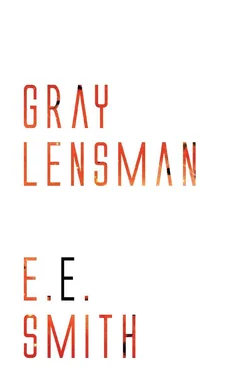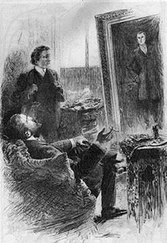E. E. Smith - Gray Lensman
Здесь есть возможность читать онлайн «E. E. Smith - Gray Lensman» — ознакомительный отрывок электронной книги совершенно бесплатно, а после прочтения отрывка купить полную версию. В некоторых случаях можно слушать аудио, скачать через торрент в формате fb2 и присутствует краткое содержание. Жанр: unrecognised, на английском языке. Описание произведения, (предисловие) а так же отзывы посетителей доступны на портале библиотеки ЛибКат.
- Название:Gray Lensman
- Автор:
- Жанр:
- Год:неизвестен
- ISBN:нет данных
- Рейтинг книги:4 / 5. Голосов: 1
-
Избранное:Добавить в избранное
- Отзывы:
-
Ваша оценка:
- 80
- 1
- 2
- 3
- 4
- 5
Gray Lensman: краткое содержание, описание и аннотация
Предлагаем к чтению аннотацию, описание, краткое содержание или предисловие (зависит от того, что написал сам автор книги «Gray Lensman»). Если вы не нашли необходимую информацию о книге — напишите в комментариях, мы постараемся отыскать её.
Gray Lensman — читать онлайн ознакомительный отрывок
Ниже представлен текст книги, разбитый по страницам. Система сохранения места последней прочитанной страницы, позволяет с удобством читать онлайн бесплатно книгу «Gray Lensman», без необходимости каждый раз заново искать на чём Вы остановились. Поставьте закладку, и сможете в любой момент перейти на страницу, на которой закончили чтение.
Интервал:
Закладка:
Triplanetary needed something vastly better than its meteor. In fact, without a better, its expansion into an inter-systemic organization would be impossible. It needed something to identify a Patrolman, anytime and anywhere. It must be impossible of duplication or imitation. In fact, it should kill, painfully, any entity attempting imposture. It should operate as a telepath, or endow its wearer with telepathic power—how else could a Tellurian converse with peoples such as the Rigellians, who could not talk, see, or hear?
Both Solarian Councillor Virgil Samms and his friend of old, Commissioner of Public Safety Roderick Kinnison, knew these things; but they also knew how utterly preposterous their thoughts were; how utterly and self-evidently impossible such a device was.
But Arisia again came to the rescue. The scientist who had been assigned the meteor problem, one Dr. Nels Bergenholm—who, all unknown to even his closest associates, was a form of flesh energized at various times by various Arisians—reported to Samms and Kinnison that:
1) Physical science could not then produce what was needed, and probably never could do so.
2) Although it could not be explained in any symbology or language known to man, there was—there must be—a science of the mind; a science whose tangible products physical science could neither analyze nor imitate.
3) Virgil Samms, by going in person to Arisia, could obtain exactly what was needed.
“Arisia! Of all the hells in space, why Arisia?” Kinnison demanded. “How? Don’t you know that nobody can get anywhere near that damn planet?”
“I know that the Arisians are very well versed in that science. I know that if Councillor Samms goes to Arisia he will obtain the symbol he needs. I know that he will never obtain it otherwise. As to how I know these things—I can’t—I just—I know them. I tell you!”
And, since Bergenholm was already as well known for uncannily accurate “hunches” as for a height of genius bordering perilously closely on insanity, the two leaders of Civilization did not press him further, but went immediately to the hitherto forbidden planet. They were—apparently—received hospitably enough, and were given Lenses by Mentor of Arisia. Lenses which, it developed, were all that Bergenholm had indicated, and more.
The Lens is a lenticular structure of hundreds of thousands of tiny crystalloids, built and tuned to match the individual life force—the ego, the personality—of one individual entity. While not, strictly speaking, alive, it is endowed with a sort of pseudo-life by virtue of which it gives off a strong, characteristically-changing, polychromatic light as long as it is in circuit with the living mentality with which it is in synchronization. Conversely, when worn by anyone except its owner, it not only remains dark but it kills—so strongly does its pseudo-life interfere with any life to which it is not attuned. It is also a telepathic communicator of astounding power and range—and other things.
Back on Earth, Samms set out to find people of Lensman caliber to send to Arisia. Kinnison’s son Jack, and his friend Mason Northrop, Conway Costigan, and Samms’s daughter Virgilia—who had inherited her father’s hair and eyes, and who was the most accomplished muscle-reader of her time—went first. The boys got Lenses, but Jill did not. Mentor, who was to her senses a woman seven feet tall, told her that she did not then and never would need a Lens—and it should be mentioned here in passing that no two entities who ever saw Mentor ever saw the same thing.
Frederick Rodebush, Lyman Cleveland, young Bergenholm, and a couple of commodores of the Patrol—Clayton of North America and Schweikert of Europe—just about exhausted Earth’s resources. Nor were the other Solarian planets very helpful, yielding only three Lensmen—Knobos of Mars, Dal-Nalten of Venus, and Rularion of Jove. Lensman material was extremely scarce stuff.
Knowing that his proposed Galactic Council would have to be made up exclusively of Lensmen, and that it should represent as many solar systems as possible, Samms visited the various systems which had been colonized by humanity, then went on: to Rigel Four, where he found Dronvire the Explorer, who was of Lensman grade; and next to Pluto, where he found Pilinixi the Dexitroboper, who very definitely was not; and finally to Palain Seven, an ultra-frigid world where he found Tallick, who might—or might not—go to Arisia some day. And Virgil Samms, being physically tough and mentally a real Crusader, survived these various ordeals.
For some time the existence of the newly-formed Galactic Patrol was precarious indeed. Archibald Isaacson, head of Interstellar Spaceways, wanting a monopoly of interstellar trade, first tried bribery; then, joining forces with the machine of Senator Morgan and Boss Towne, assassination. The other Lensmen and Jill Samms saved her father’s life, after which Kinnison took Samms to the safest place on Earth—deep underground beneath The Hill: the tremendously fortified, superlatively armed fortress which had been built to be the headquarters of the Triplanetary Service.
But even there the First Lensman was attacked, this time by a fleet of space-ships in full battle array. By that time, however, the Galactic Patrol had a fleet of its own, and again the Lensmen won.
Knowing that the final and decisive struggle would of necessity be a political one, the Patrol took over the Cosmocrat party and set out to gather detailed and documented evidence of corrupt and criminal activities of the Nationalists, the party then in power. Roderick ("Rod the Rock") Kinnison ran for President of North America against the incumbent Witherspoon; and, after a knock-down-and-drag-out political battle with Senator Morgan, the voice of the Morgan Towne-Isaacson machine, he was elected.
And Morgan was murdered—supposedly by disgruntled gangsters; actually by his Kalonian boss, who was in turn a minion of the Eddorians—simply and merely because he had failed. North America was the most powerful continent of Earth; Earth was the Mother Planet, the Leader, the Boss. Hence, under the sponsorship of the Cosmocratic Government of North America, the Galactic Council and its arm, the Galactic Patrol, came into their own. At the end of R. K. Kinnison’s term of office, at which time he resumed his interrupted duties as Port Admiral of the Patrol, there were a hundred planets adherent to Civilization. In ten years there were a thousand; in a hundred years a million: and it is sufficient characterization of the light but effective rule of the Galactic Council to say that in all the long history of Civilization no planet whose peoples have ever voted to adhere to Civilization has ever withdrawn from it.
Time went on; the prodigiously long blood-lines, so carefully manipulated by Mentor of Arisia, neared culmination. Lensman Kimball Kinnison was graduated Number One of his class—as a matter of fact, although he did not know it, he was Number One of his time. And his female counterpart and complement, Clarrissa MacDougall of the red-bronze-auburn hair and the gold-flecked tawny eyes, was a nurse in the Patrol’s immense hospital at Prime Base.
Shortly after graduation Kinnison was called to Prime Base by Port Admiral Haynes. Space piracy had become an organized force; and, under the leadership of someone or something known as “Boskone”, had risen to such heights of power as to threaten seriously the Galactic Patrol itself. In one respect Boskonia was ahead of the Patrol, its scientists having developed a source of power vastly greater than any known to Galactic Civilization. It had fighting ships of a new and extraordinary type, from which even convoyed shipping was no longer safe. Being faster than the Patrol’s fastest cruisers and yet more heavily armed than its heaviest battleships, they had been doing practically as they pleased throughout space.
Читать дальшеИнтервал:
Закладка:
Похожие книги на «Gray Lensman»
Представляем Вашему вниманию похожие книги на «Gray Lensman» списком для выбора. Мы отобрали схожую по названию и смыслу литературу в надежде предоставить читателям больше вариантов отыскать новые, интересные, ещё непрочитанные произведения.
Обсуждение, отзывы о книге «Gray Lensman» и просто собственные мнения читателей. Оставьте ваши комментарии, напишите, что Вы думаете о произведении, его смысле или главных героях. Укажите что конкретно понравилось, а что нет, и почему Вы так считаете.












